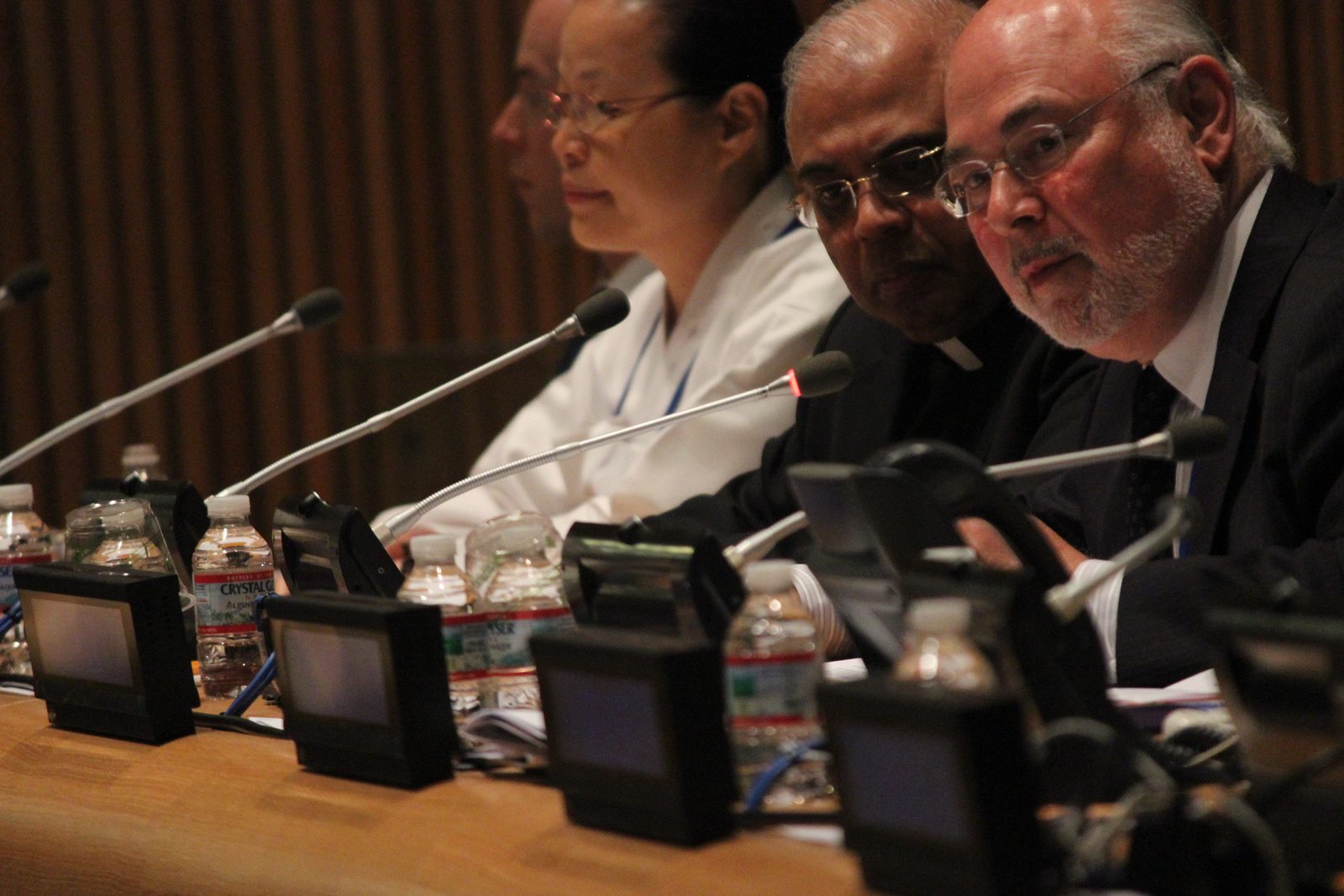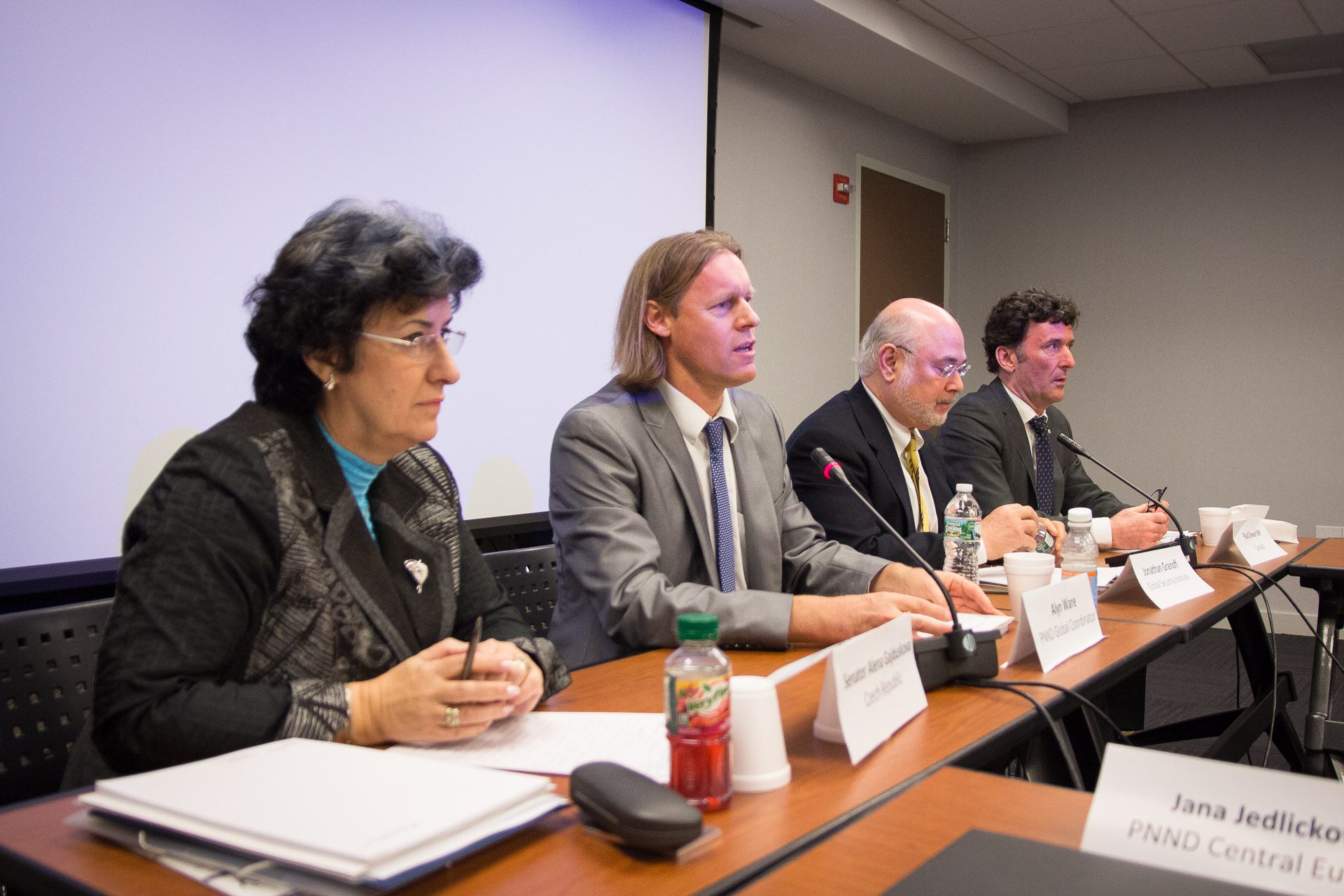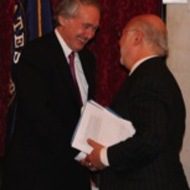Events, reports, and analysis
Spring, 2014
A Message from the President
The Global Security Institute is an organization with physical and fiscal resources not commensurate with its mission to advance international cooperation, the rule of law, and the abolition of nuclear weapons. However, there are other resources that make a difference. We have found that by working with others synergies can be generated and greater influence exercised. We have also found that, with focus, leverage can be achieved. This report implicitly expresses our deep appreciation for the many individuals, organizations, and nations with which we have been able to serve recently.
As long as the security of states is primarily defined by military power and not by the actual conditions of people, the full elimination of nuclear weapons will remain difficult. Progress will be rapid with the recognition of the need for greater cooperation in meeting shared challenges, such as ensuring a healthy climate, oceans and rain forests, security in neighborhoods, eliminating disease and poverty, and other actual present threats. Moreover, the growing awareness of the humanitarian consequences of the use of a nuclear weapon and the distorting impact of the immorality of threatening to end humanity in the interest of preserving the state are awakening new voices for nuclear weapons elimination.
The recognition of the empirical facts of global environmental degradation coupled with clear moral vision will soon bring surprising progress on changing the approach to security. This change requires civil society’s active engagement and leadership. We are honored to be part of that process.

Jonathan Granoff
President
Nuclear Weapons and the Moral Compass
 |
|
|
On April 30, 2014, the Global Security Institute, with the co-sponsorship of the Permanent Mission of the Philippines, and with the support of Religions for Peace, the World Evangelical Alliance, and United for Religions Initiative, held an extraordinary panel event in the United Nations Trusteeship Council Chamber with presentations by: UN High Representative for Disarmament Affairs Angela Kane; H.E. Archbishop Francis A. Chullikatt, Permanent Observer of the Holy See to the United Nations; Bishop William Swing, United Religions Initiative; Reverend Tyler Wigg-Stevenson, World Evangelical Alliance; Dr. William Vendley, ReligionsforPeace; Ven. Dr. Chung Ohun Lee, Won Buddhism International to the UN; Dr. Muzammil Siddiqi, Fiqh Council of North America; and Rabbi Peter Knobel, Central Conference of American Rabbis. Ambassador Libran Cabactulan, the Permanent Representative of the Philippines and president of the successful 2010 NPT Review Conference, and Jonathan Granoff, President of Global Security Institute, co-chaired the event. Supporting organizations for the event included the United Religions Initiative, Religions for Peace, and the World Evangelical Alliance.
Read the full event report
Watch the full video of the event:
Middle Powers Initiative Convenes Framework Forum
The network of Parliamentarians for Nuclear Non-Proliferation and Disarmament (PNND) held a resoundingly successful Annual Assembly in Washington, DC, February 25-28, 2014. US Senator Ed Markey functioned as honorary Chair of the event, which was organized jointly by PNND and the Friedrich Ebert Foundation, with support from the Simons Foundation and the Kazakhstan Embassy to the United States.
 |
|
|
|
Here are some of the highlights:
- Over 300 participants attended the PNND reception at the historic Kennedy Caucus Room in the US Senate, including both Democrat and Republican members of congress and over 30 congressional staffers. The reception included an incredible presentation by Karipbek Kuyukov, Honorary Ambassador of the ATOM Project, and an exhibition of his profound paintings;
- The Assembly adopted a Statement for the Nuclear Security Summit;
- PNND Co-President Senator Markey used the occasion of the PNND Assembly to submit his SANE Act, (Smarter Approach to Nuclear Expenditure) to the U.S. Senate;
- There were articles on the assembly and reception in National Journal, Voice of America and Roll Call, the latter of which was distributed to every congressional office;
- PNND cooperation with Global Zero was strengthened. The PNND conference dinner featured Ambassador Richard Burt, US Chair of Global Zero. A number of PNND leaders represented at the Assembly are also Global Zero members. And a follow-up strategy meeting we organised included the Global Zero US campaign director.
- We have an exciting new group of Co-Presidents and Council Members appointed at the Assembly;
- We had participation in the Assembly by legislators, legislative assistants, disarmament experts, government reps, and reps from the UN (High Rep on Disarmament), ICRC, Red Cross, IPU, Mayors for Peace, Peace Boat, Abolition 2000, IPPNW, the ATOM Project, Global Zero, Religions for Peace, Green Cross and other civil society organizations;
- We received a letter from the Vice-President of the United States commending the announcement of the Alan Cranston Award to PNND Co-Presidents Ed Markey and Uta Zapf.
More resources:
- Summary report by PNND Coordinator Alyn Ware
- Report in the Astana Times
- Keynote luncheon remarks by UN High Representative Angela Kane
- GSI President Jonathan Granoff’s presentation, “The Goal of Global Security“
- Senator Douglas Roche’s presentation, “The Power of Parliamentarians in Abolishing Nuclear Weapons“
- Assembly program
- Photo gallery
- Invite to the Reception: Ending the Terror of Nuclear Weapons
Global Launch of Parliamentary Hearings Toward a Nuclear Weapon-Free World
“Parliamentarians in the twenty-first century have a responsibility not only to their constituents, political parties, and national legislatures, but also to global citizens who are threatened by climate change, resource depletion, unresolved conflicts and nuclear threats,” said Hon. Dr. Hedy Fry, Member of the Canadian Parliament and Special Representative on Gender to the Parliamentary Assembly of the Organisation for Security and Cooperation in Europe. “In an increasingly inter-dependent world, parliamentarians must work together across national borders to build cooperative security and the rule of law, not continue to rely on nuclear weapons which make no sense.”
Read the full event report
Global Connections Television
GSI President Jonathan Granoff discusses the NPT, Iran, and the severity of the nuclear threat in an interview with Global Connections Television, produced by Bill Miller and filmed in the United Nations television studios.
German, US Legislators to Receive Alan Cranston Award
The reception, held on the eve of Nuclear Remembrance Day, was organized as part of the annual assembly of Parliamentarians for Nuclear Non-proliferation and Disarmament (PNND) and co-sponsored by the Embassy of Kazakhstan, a nation dedicated to ending nuclear testing and achieving a nuclear weapons free world.
Mr. Granoff also read aloud a letter sent by US Vice President Joe Biden, commending the legislators, legislative aides, disarmament experts, and others attending the PNND Assembly. Granoff quoted it, saying “Your dedication to strengthening diplomatic ties around the world on this important issue is remarkable.”
Vice President Biden made special mention of Senator Markey: “Senator Markey-you should be proud. Your leadership demonstrates the altruistic dedication that makes the Global Security Institute what it is today.” Biden also commended the Global Security Institute, of which PNND is a program, saying that “The efforts of the men and women of the Global Security Institute have made the world a safer place for everyone.”
“As Chair of the Bundestag Subcommittee on Disarmament and Arms Control from 1998 until her retirement in 2013, under both Conservative and Social Democrat governments, Uta Zapf facilitated active cross-party debate in the German parliament on core security issues, helping to shape and shift German policy towards disarmament and multi-lateralism,” Granoff said. “She has also advanced nuclear disarmament initiatives in regional bodies, with leadership positions in the Parliamentary Assemblies of NATO and the OSCE, as well as participating in international forums such as the United Nations General Assembly and Non-Proliferation Treaty meetings.”
In commending Senator Markey, Granoff noted that since he was first elected to the US Congress in 1976, and subsequently to the US Senate in 2013, Markey has “worked to end the proliferation of nuclear weapons and to build a sustainable world.” Granoff added: “He championed the movement to freeze nuclear weapons, to improve nuclear power plant security, and to address climate change,” In 2012, Markey introduced into the House of Representatives the Smarter Approach to Nuclear Expenditures (SANE), which would reduce US nuclear armaments and cut the deficit by $100 billion over the next ten years.
The Award was established by the Global Security Institute in memory of its founder Senator Alan Cranston, a long-time peace, disarmament and civil rights advocate who is remembered for, among other things, fighting a law suit against Hitler in 1939, serving as President of the World Federalist Association, serving in the senate for 24 years – including 14 years as the Democratic Party Whip, and setting a world record for the senior 100-yard dash at 55 years old.
Previous recipients of the award have been Jayanatha Dhanapala, 2002 (Award presented to him by Jane Goodall at the United Nations in New York), Nancy Pelosi, 2003 (Award presented to her by Pierce Brosnan at a high-level event in San Francisco) and Ted Turner, 2005 (Award presented to him by Mikhael Gorbachev at the United Nations in New York).
For further information and photos about the PNND Assembly and the reception see:
* The ATOM Project, PNND Participate in Anti-Nuclear Weapons Event at U.S. Senate;
* Nuclear Fallout Colors Pro-Test Ban Artist’s Memories, Roll Call, Feb 27. Distributed to every U.S. Congress office;
* PNND Assembly: Climbing the Mountain;
* Parliamentarians call on Nuclear Security Summit process for nuclear abolition;
* Photos of the PNND reception at the Kennedy Caucus Room of the US Senate;
* Photos of the PNND Assembly.
New Initiatives and Ideas
Organized by Canadian Pugwash, a May 8 panel featured Jonathan Granoff, President of the Global Security Institute and Senior Advisor of the American Bar Association’s Committee on Arms Control and National Security; Erika Simpson, Associate Professor of Inter- national Relations at Western University; and Michael Simpson, Director of One Sky-Canadian Institute of Sustainable Living.
In a speech that connected the nuclear weapons issue to the environmental issue, Mr. Granoff pointed out that what nuclear weapons and the climate have in common is the existential threat to the survival of civilization. Granoff argued that advocacy for the elimination of nuclear weapons has not suceeded because the debate is framed within a traditional “national risk vs. benefit” analysis. “In reality, they constitute a pillar in a systematically inadequate international security order, which does not effectively address a set of pressing global threats,” writes Mr. Granoff in the piece, “The Goals of Gobal Security.”
Read Mr. Granoff’s piece, “The Goals of Global Security”
Read the full report in RCW’s News in Review.
Nuclear Disarmament Through Inter-Parliamentary Forums
This event convened by Parliamentarians for Nuclear Non-proliferation and Disarmament (PNND) and chaired by Jonathan Granoff of the Global Security Institute examined nuclear non-proliferation and disarmament processes in inter-parliamentary forums.
Ms. Paddy Torsney, the Permanent Representative of the Inter-Parliamentary Union (IPU) to the UN, spoke about the ways parliamentarians can unite legal, political, and institutional elements to address nuclear non-proliferation and disarmament. She reviewed steps parliamentarians had undertaken to date, and pre- sented a handbook published by PNND and IPU with information for parliamentarians to implement future initiatives. She encouraged parliamentarians to see which of the suggested good practices could be implemented in their own countries.
Next up, Ms. Hedy Fry of Canada underscored the important role parliamentarians have in moving an agenda forward, but pointed out that first they must be made aware of the issue, which had not been done consistently for nuclear non-proliferation and disarmament. She also challenged the participants with her assessment of the Budapest agreement and the current situation in Ukraine, presenting it as an opportunity to look at how such deals are negotiated, and encouraged the participants to think about what role parliamentarans could play.
Mr. Bill Kidd, a member of the Scottish parliament, spoke about the unique position of parliamentarians to raise this issue at national and international levels. He provided examples in Scotland both in terms of how the parliament addresses the Trident base, and also at the international level with the Marshall Islands lawsuit motion he presented to the Scottish parliament. He underscored the responsibility of elected officials to serve their electorate rather than to aim for reelection. Mr. Kidd praised efforts thus far in Oslo and Nayarit, and expressed hope for similar successes at the upcoming Vienna conference.
PNND founder Alyn Ware, the final speaker, explained that looking at nuclear weapons as just a technical or military issue would not solve the problem, and that engagement should rather be done in multiple forums. He posited that there are many options to address an issue before sanctions or collective force, but too often they are not discussed. He proposed highlighting cases where such tactics were used to resolve conflict, and emphasized that they should be backed up through education initiatives.
The panel concluded with a discussion on the role of delegations, with general agreement that a diverse delegation with members of opposition parties as well as NGOs is a good way to hold governments accountable for their actions overseas.
Eruditio
Jonathan Granoff’s “Security Reflections: A Holistic Approach without Nuclear Weapons,” is featured as the lead article of the March 14 issue of Eruditio, the e-journal of the World Academy of Art and Science. The following is an excerpt:
Thinking Creatively: In and Out of the NPT Box
On December 11, 2013, the Global Security Institute (GSI), in partnership with the Friedrich Ebert Stiftung (FES), hosted an informal roundtable discussion with presentations by Ambassador Libran Cabactulan of the Phillippines, President of the 2010 Review Conference of the Nuclear Non-Proliferation Treaty, and Ambassador Thomas Graham, Jr., former US diplomat now serving as Chairman of the Bipartisan Security Group. The discussion also included several highly prominent non-governmental experts, including Joan Rohlfing of the Nuclear Threat Initiative, Tom Collina of the Arms Control Association, Stephen Young of the Union of Concerned Scientists, Leonie Willenbrik of FES, and Aviva Kushner of GSI. Pia Bungarten, FES Representative to the United States, and Jonathan Granoff, GSI President, chaired the event.
Harvard Divinity School Convenes “Religions and Peace: Do Universities Have a Role?”
Participants on the panel included Martha Minow, Dean of Harvard Law School; Shaun Casey, Special Advisor to US Secretary of State John Kerry for faith-based initiatives; Matthew Hodes, Director of the United Nations Alliance of Civilizations; Jocelyn Cesari, Director of Harvard’s Islam and the West Program; and was moderated by Professor Diana Eck, Director of the Pluralism Project. Participants in the follow-up dialogue included J. Bryan Hehir of Harvard Kennedy School; Professor Ali Asani, Chair of the Department of Near Eastern Languages and Civilizations; and Dr. Jamil Mahuad, former President of Ecuador and Co-Director of Harvard’s Project on the Prevention of Global Violence.
Video presentations can be found here.






